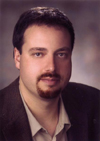Career
I have always been interested in politics and especially international relations. It probably has a lot to do with my personal history—I was born in the Soviet Union, I lived in Israel and my mother was always politically active.
Teaching Style
I believe the only way to truly learn is not though lecture, but rather through discussion and the free flow of ideas. I make an effort to get students involved in the subject through discussion of the topics we cover. I have also been incorporating projects into my classes, which allow students to address some of the issues facing the international system.
Additional Research
My research focuses heavily on the role national identity plays in a country’s foreign policy. Most recently I have been examining the role of national identity in the foreign policy of post-Soviet Russia and Ukraine.
Best Part of Teaching
The best part is the students, and I am not pandering. They are the reason I do this.
Favorite Building
My favorite building is Chapman Hall. I know it is not the newest or the most up to date, but it has the most character. I like historic buildings, and Chapman is the most historic … and it’s got a ghost in it, which also is interesting.
Small Class Sizes
Mount Union can offer something that most other schools cannot: it can provide you with the education you would find at a big state school but with the added benefit of small classes and faculty members who really know their students. I would compare the programs offered by the Department of Political Science and International Studies favorably to any programs offered at much larger schools, but you don’t end up in a class of 100 or more.
Preparing Students
In our department, we encourage students to get an internship. It gives students practical, real-world experience that they can take with them. At the same time, we try to provide a strong theoretical basis in the classroom.
- National Role Conceptions in a New Millennium: Defining a Place in a Changing World, co-edited with Francis Schortgen and Gordon M. Friedrichs. (Routledge, 2022)
- Achievements and Legacy of the Obama Presidency: Hope and Change?, co-edited with Ronald Eric Matthews and Francis Schortgen. (Palgrave Macmillan, 2022)
- Perspectives on the Legacy of George W. Bush, co-edited with Ronald Eric Matthews (Cambridge Scholars Press, 2009)
- “President Obama’s Legacy and Record: Introduction,” PS: Political Science & Politics (January 2017)
- “Building a National Security Program at a Small College: Identifying Opportunities, Overcoming Challenges” co-authored with Francis Schortgen in Journal of Political Science Education, (January, 2016)
- “Ethnicity and National Identity Externalized: The impact of identity on foreign policy in post-Soviet Ukraine.” in Santosh Saha, (ed.) The Politics of Ethnicity and National Identity (Peter Lang, 2007)
- “Role Theory and Foreign Policy Change: The Transformation of Russian Foreign Policy in the 1990s” in International Politics, 2005, (42).
